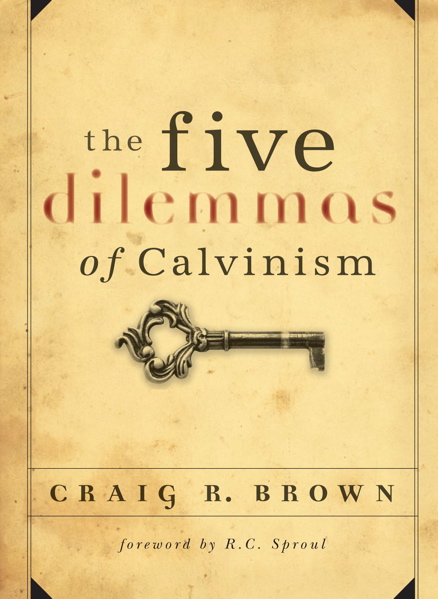
Craig R. Brown
Reviewed by: Arthur J. Fox
The Five Dilemmas of Calvinism, by Craig R. Brown. Published by Ligonier Ministries, 2007. Paperback, 128 pages, list price $9.00. Reviewed by OP pastor Arthur J. Fox.
This treatment of Calvinism is well written and easy to understand. In chapter 1, Craig Brown surveys the history of the doctrines of Calvinism, summarizing the famous TULIP (which stands for Total depravity, Unconditional election, Limited atonement, Irresistible grace, and the Perseverance of the saints). In chapter 2, he compares Calvinism to Arminianism, which he likens to a daisy: "He loves me, he loves me not" (p. 24). He spends the remaining five chapters answering five dilemmas, that is, five objections to the doctrines of Calvinism: If God is in control and predetermines everything, how can man be accountable to God for his own actions? If we are saved by grace, apart from works, what motivation is there for doing good works? If God has predetermined everything, why pray or do evangelism? If God is both sovereign and good, why is there evil in the world? If man is born sinful, where do babies go when they die?
You will have to obtain the book to get the answers to those questions. Brown's answers are traditional, and there are really no surprises in them, except for unique takes on the last two questions. Here he is a bit controversial, in the view of this reviewer.
In dealing with evil, Brown says that "everything in this world has an opposite.… I believe God created everything good. He did not create anything evil. But when he created good, evil automatically came into being as the antithesis or opposite of good" (p. 100). Here the author runs the risk of saying that something comes into existence apart from God's creation (the key word being "automatically"). Yet, he is faithful to the doctrine that God does not tempt and he is not the author of sin. Let the reader meditate a long time on this, for the author's thoughts seem rather original here.
Second, as for babies who die, Brown agrees with Warfield and Spurgeon that the babies of Christians are elect. But then he adds, "And I believe and trust that God saves all babies who die by his perfect grace" (pp. 111–12, the key word being "all"). But then the author qualifies his thinking by saying, "There is no explicit teaching on the eternal destination of dying babies" (p. 112). Has the author taken one step forward and then half a step back? Let the reader decide!
All in all, this book is a refreshing and clear statement of the Reformed faith. It is heartily recommended to all. Perhaps a few copies ought to be on hand in your church for members to take home and read for themselves.
April 27, 2025
The Devoted Mind: Seeking God’s Face in a World of Distraction
April 20, 2025
April 13, 2025
Suffering: God’s Purpose in Our Pain
April 06, 2025
Sunday Matters: 52 Devotionals to Prepare Your Heart for Church
March 30, 2025
On the Trail with a Missionary
March 23, 2025
Midnight Mercies: Walking with God Through Depression in Motherhood
March 16, 2025
© 2025 The Orthodox Presbyterian Church